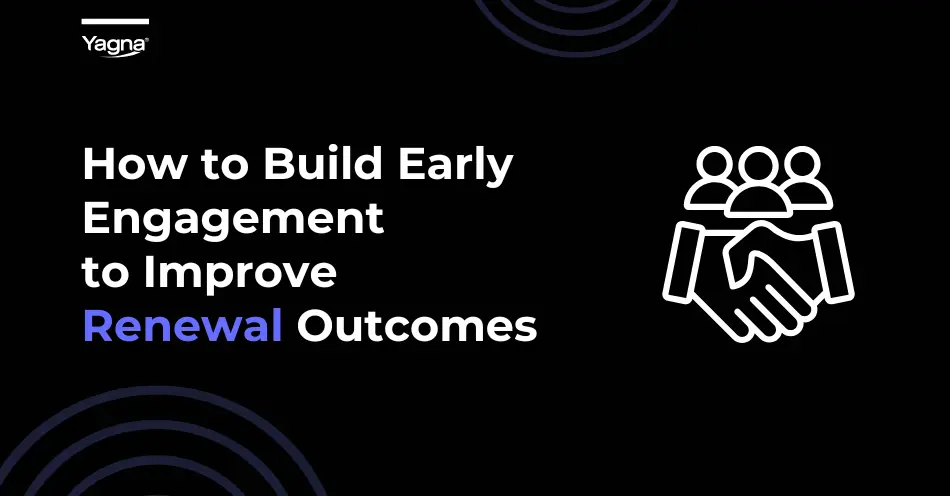
How to Build Early Engagement to Improve Renewal Outcomes
Building early engagement, especially when it comes to customer renewals, is all about creating a foundation of trust and communication long before the contract is up. It’s about understanding your customers’ needs and proactively reaching out to help them succeed.
Here’s how you can build that early engagement effectively:
Start with a Customer-Centric Mindset
The first step is to put yourself in the customer’s shoes. Think about their business goals, challenges, and how your product or service can continue adding value over time. Rather than focusing solely on the renewal, shift the conversation towards their evolving needs. The more you understand their journey, the better you can serve them.
Ask yourself questions like:
- What are the customer’s current business priorities?
- What challenges are they facing in their industry right now?
- How are they using our product or service to achieve their goals?
- Have their needs changed since the last renewal?
- Are there any opportunities where our product can help them grow or overcome obstacles?
- What kind of results are they hoping to see in the next 6-12 months?
- Who else in their organization should we be talking to about their future needs?
Set Up Regular Cadence
Early engagement doesn’t mean waiting until renewal time to start talking. It means having regular touchpoints throughout the year. These can be quarterly business reviews (QBRs), monthly cadence, or even informal emails or calls just to see how things are going. The key to have a process and a cadence for communications use these interactions to gather feedback, discuss any issues, and reinforce the value that your product provides. This way, by the time renewal comes around, you’re already aligned and ready to continue the partnership.
Provide Value Early and Often
The key to early engagement is adding value before the renewal conversation even starts. Share new insights, product updates, or industry trends that could help your customer. Offer solutions to problems they might not have even realized were possible. By being proactive in providing value, you’re showing that you’re there for the long haul, not just when it’s time to renew.
Check the Data
Use your customer data to predict their future needs. If you’re tracking their usage patterns, pain points, or even social media activity, you can identify opportunities to engage before they ask. For instance, if you see a customer consistently using a feature, you could proactively introduce them to advanced tools that could streamline their experience even more. Early engagement is all about anticipating what your customers need before they even voice it.
Personalize - Personalize and Personalize
One-size-fits-all approaches don’t work when building meaningful early engagement. Tailor your messaging and interactions based on the customer’s specific situation, business goals, and challenges. Whether it’s a phone call, email, or video chat, show them you’ve invested the time to understand their business and are offering solutions that truly fit their unique needs.
Establish a Renewal Timeline
Don’t let your customers be surprised when renewal time arrives. Start by creating a clear, shared timeline for the renewal process. Let them know when you’ll be checking in, and remind them of the upcoming renewal dates well in advance. This sets expectations and avoids the stress of last-minute rushes.
Involve the Right People Early On
When you know renewal season is approaching, make sure you’re involving the right people on both sides of the conversation—this means engaging with decision-makers, influencers, and even new stakeholders who may have joined the account since the last renewal. Early engagement ensures that everyone is on the same page, and you’re not caught off guard when renewal discussions begin.
Create a Sense of Partnership
Treat every customer like a partner, not a transaction. Regularly ask for feedback, share insights, and show them that you’re there to help them grow and succeed, not just sell them a service. Customers who feel like they’re part of a partnership are more likely to engage early and renew without hesitation.
Be Transparent and Open
One of the best ways to build early engagement is by being open and transparent. Discuss any changes that might affect their renewal, whether it’s pricing changes, new features, or shifts in service offerings. Honest, open communication builds trust and removes any surprise when it’s time to renew.
Use Technology to Your Advantage
Automation tools and CRM systems can help track key milestones and customer interactions. Use automation to set up alerts for when a customer might be ready for a check-in, or when a renewal conversation is approaching. Technology makes it easier to stay proactive and organized, ensuring that you never miss an opportunity to engage early.
In Summary
Building early engagement isn’t about pushing renewals earlier—it’s about fostering a relationship of trust, communication, and mutual growth well ahead of the contract end date. By putting the customer’s needs first, offering value early, and using data to guide their approach, you create a foundation that turns renewals into a natural next step in a long-lasting partnership.
What strategies have you used to engage customers earlier in the process? I’d love to hear how it’s worked for you!
